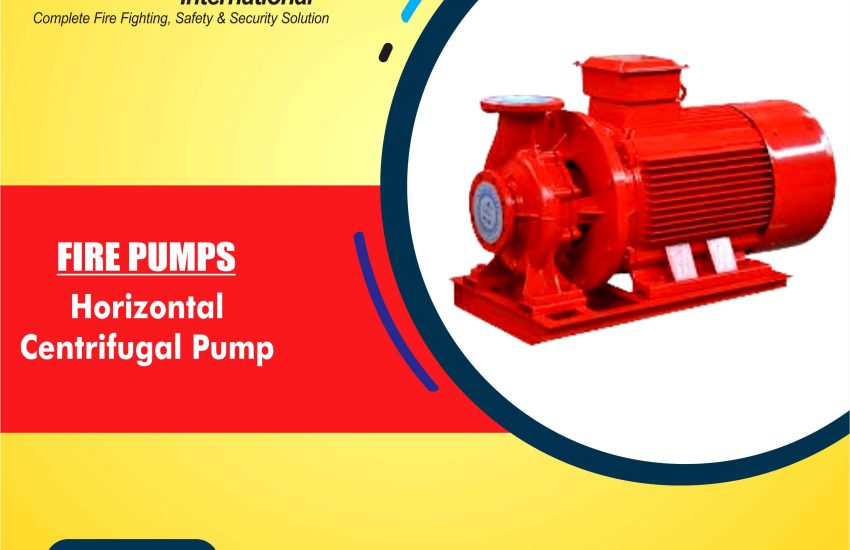Horizontal Centrifugal Pump is one of the most common types of pumps used in a variety of industries, including water treatment, manufacturing, chemical processing, and fire protection. Understanding its operation, benefits, and applications is essential when selecting the right pump for your needs. In this guide, we will walk you through all the key aspects of horizontal centrifugal pumps, from their basic principles to their diverse applications and advantages.
What is a Horizontal Centrifugal Pump?
A horizontal centrifugal pump is a type of pump that uses centrifugal force to move liquids. Unlike vertical pumps, these pumps have a horizontal orientation. The pump consists of an impeller that rotates inside a casing, which accelerates the liquid and directs it to the discharge side of the pump. Horizontal centrifugal pumps are commonly used to move large volumes of liquids at moderate to high flow rates and pressures.
How Does a Horizontal Centrifugal Pump Work?
Horizontal centrifugal pumps operate based on the principle of centrifugal force. Here’s a simplified breakdown of how they function:
- Liquid Intake: The liquid enters the pump through the suction nozzle.
- Impeller Action: The impeller rotates within the pump casing, transferring energy to the liquid. This causes the liquid to gain velocity.
- Centrifugal Force: The high-speed rotation of the impeller generates centrifugal force, which pushes the liquid to the outer edge of the casing.
- Discharge: The liquid then exits the pump through the discharge nozzle at high velocity and pressure, ready for use in the system.
Key Features of Horizontal Centrifugal Pumps
- Simple Design: Horizontal centrifugal pumps have a relatively simple and straightforward design, making them easy to operate and maintain.
- High Efficiency: These pumps are known for their high efficiency in transferring liquids over long distances.
- Versatile Applications: They can handle a wide range of liquids, including clean water, chemicals, and oil-based products.
- Durable Materials: Horizontal centrifugal pumps are often constructed with durable materials, such as cast iron, stainless steel, or bronze, to ensure longevity and resistance to corrosion.
- Single or Multi-Stage Options: These pumps come in single-stage or multi-stage configurations, with multi-stage pumps offering higher pressures.
Advantages of Horizontal Centrifugal Pumps
- High Flow Rates: Horizontal centrifugal pumps can achieve high flow rates, making them ideal for large-scale applications such as water supply and industrial processes.
- Cost-Effective: The relatively simple design of these pumps makes them less expensive compared to other types of pumps. They also require minimal maintenance, further reducing operational costs.
- Compact Design: The horizontal orientation allows for a more compact installation footprint compared to vertical pumps, which require more vertical space.
- Flexible Installation: These pumps can be easily installed in various systems, including pipelines, water treatment plants, and HVAC systems.
- Long Lifespan: With proper maintenance, horizontal centrifugal pumps can last for many years, providing reliable service over time.
Applications of Horizontal Centrifugal Pumps
Horizontal centrifugal pumps are versatile and find application in various industries, including:
- Water Treatment: Used to transfer water for both municipal and industrial water treatment processes.
- Chemical Processing: Used to move corrosive or abrasive liquids in chemical manufacturing and processing.
- Oil and Gas: Ideal for transporting crude oil, natural gas, and other petroleum-based liquids.
- Agriculture: Used for irrigation systems and moving water across farms.
- HVAC Systems: These pumps are used to circulate water in heating and cooling systems.
- Fire Protection: Horizontal centrifugal pumps are commonly used in fire suppression systems to ensure a reliable water supply during emergencies.
Maintenance of Horizontal Centrifugal Pumps
Proper maintenance is crucial to the performance and longevity of horizontal centrifugal pumps. Here are some key maintenance tips:
- Regular Inspections: Inspect the pump and its components regularly to identify any wear or damage, particularly the impeller, bearings, and seals.
- Lubrication: Ensure that all moving parts are properly lubricated to minimize friction and reduce wear.
- Check for Leaks: Inspect the pump casing, suction, and discharge pipes for any signs of leaks.
- Cleaning: Keep the pump casing and intake area clean to prevent clogging or damage to the internal components.
- Monitor Vibration: Excessive vibration can indicate issues with the pump alignment or impeller imbalance, so regular vibration checks are necessary.
Factors to Consider When Choosing a Horizontal Centrifugal Pump
When selecting a horizontal centrifugal pump, several factors should be taken into account to ensure optimal performance:
- Flow Rate Requirements: Determine the required flow rate (GPM or LPM) for your system. This helps you select a pump with the appropriate capacity.
- Head Pressure: Calculate the total head or pressure that the pump must overcome to move the liquid effectively. This is essential for selecting the correct pump type and size.
- Liquid Characteristics: Consider the nature of the liquid you plan to pump, such as its viscosity, temperature, and corrosiveness. Choose a pump made of materials that can handle these properties.
- Power Supply: Decide between electric or diesel-powered pumps, depending on the availability of power and the operating environment.
- Pump Efficiency: Ensure that the pump is energy-efficient to reduce operational costs and energy consumption.
Conclusion
Horizontal Centrifugal Pump offer a wide range of benefits, including efficiency, durability, and versatility. These pumps are essential in industries like water treatment, chemical processing, and fire protection, providing reliable performance for various applications. By understanding the key features, benefits, and maintenance needs of these pumps, you can ensure that your system operates smoothly and effectively. With proper selection and maintenance, a horizontal centrifugal pump can provide years of reliable service.
Specification:
Flow: 1~300L/s
Head: 0.15~1.6MPa
Caliber: 25~500mm
Speed: 960~2900r/min
Power: 0.75~160/6p kW
Working Pressure: 1.6MPa


